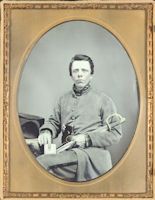June 24—McConnellsburgh, Pa., was occupied by the rebel cavalry this evening, after a short resistance by the Twelfth Pennsylvania cavalry.—Great excitement existed at Harrisburgh, Pa., on the approach of the rebels, who were “slowly advancing on Carlisle;” many merchants packed up their goods ready for shipment, and martial law was proposed, “to prevent all the able-bodied men from leaving the city.” The Mayor issued an order, calling upon the people to stand firm, and prohibiting the sale of all liquors.—The Eleventh New-York artillery left Rochester, for Harrisburgh.
—Shippensburgh, Pa., was evacuated by the National troops, and immediately occupied by rebel cavalry.—At Shclbyville, Tenn., the rebels were defeated by the National troops, under Gen era! Mitchell.—(Docs. 84 and 112.)
—The following General Orders were issued from the War Department at Washington:
I. By direction of the President, that part of the Middle Department west of Hancock, including the adjacent counties of Ohio, will constitute the Department of West-Virginia. Brigadier-General B. P. Kelley is placed in command of the Department of West-Virginia.
II. Major-General W. S. Hancock, U. S. volunteers, is, by direction of the President, assigned to the command of the Second army corps, in place of Major-General D. N. Couch, transferred to another command.
—The rebel General R. S. Ewell, at Chambersburgh, Pa., issued the following order:
First. The sale of intoxicating liquors to this command, without written permission from a major-general, is strictly prohibited.
Second. Persons having liquor in their possession are required to report the fact to the provost-marshal, or the nearest general officer, stating the amount and kind, that a guard may be placed over it, and the men prevented from getting it
Third. Any violation of Part I. of these Orders, or failure to comply with Part II., will be punished by the immediate confiscation of all liquors in the possession of the offending parties, besides rendering their other property liable to seizure.
Fourth. Citizens of the country, through which the army may pass, who are not in the military service, are admonished to abstain from all acts of hostility upon pain of being dealt with in a summary manner. A ready acquiescence to the demands of the military authorities will serve to lessen the rigors of war.
—The army of the Cumberland, excepting the division under General Van Cleve, commenced a forward movement from Murfreesboro, marching by the Shelbyville and Manchester Roads, and skirmishes took place at Guy’s, Liberty, and Hanover Gaps, Tenn.—(Docs. 37, 112, and 120.)
—Colonel J. K. Mizener returned to La Grange, Tenn., from an extensive cavalry expedition south, from the same point, and reported as follows: He broke up the command under General George, at Panola; destroyed the railroad bridge at the Yocokaway, and the trestle-work just beyond, and a portion of the road from there north.
He then crossed the Tallahatchie, coming north, and pursued Chalmers beyond Coldwater, on the Helena Road. He made for the Tallahatchie to cross, and at the mouth of the Coldwater he killed fifteen or twenty of Chalmers’s men, and took forty prisoners. Ho paroled all the sick at Panola, brought away and destroyed all the army supplies, workshops, mills, tanneries, and depots. He passed within three miles of Austin and Commerce, destroying an immense amount of forage and subsistence, took from six to eight hundred horses and mules, and five hundred head of cattle. He sent detachments north and north-east, from Panola, to destroy or bring away all subsistence, forage, horses, and mules. He passed through five counties, travelled two hundred miles, and crossed three streams.
Chalmers had with him Stokes’s, Slemmcr’s, and Blythe’s men, nine hundred, with three pieces of artillery. The remainder of his force, nine hundred, fled south, via Charleston, under General George. He destroyed all the ferries at Panola and Coldwater, and lost one man killed and five wounded.
—Colonel Wilder, with his mounted infantry, hadd a sharp skirmish at Beech Grove, Tenn., with a body of rebel infantry, and succeeded in killing and disabling a large number of them, with a loss of forty of his own men.—(Doc. 120.)










